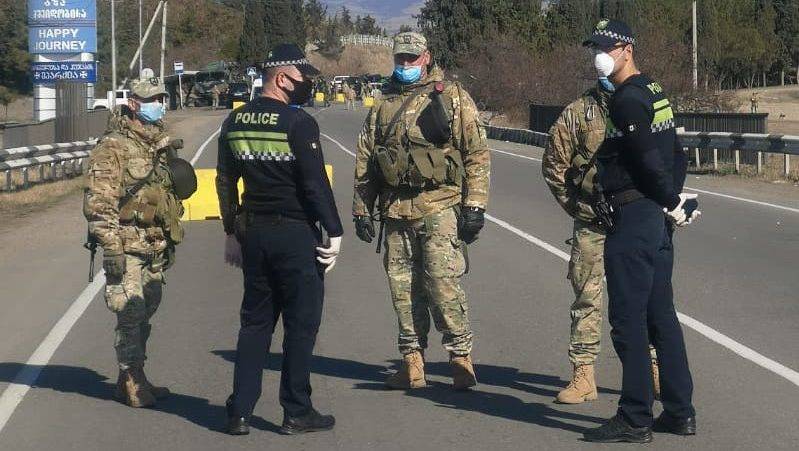საერთო ცხელი ხაზი +995 577 07 05 63


The signatory organizations address the Government of Georgia, Georgian Public Broadcaster and private media organizations to facilitate dissemination of information on Azerbaijani and Armenian languages on the COVID-19 virus and its prevention. We also call on them to take affirmative measures to prevent the spreading of hate motivated and discriminatory speeches and approaches.
On March 21, state of emergency was announced in Georgia for the prevention of COVID 19 virus extension and for protection of public health. Due to the identification of the last infection incident in the Marneuli Municipality on the 22nd of March, the government has to take more restrictive measures and declared a quarantine regime in the Marneuli and Bolnisi Municipalities.
51.3% of the population in Kvemo Kartli is ethnic Georgians, 41.8% is Azerbaijanis and 5.1% ethnic Armenian. 57.7% of the total population lives in villages and 42.3% in the urban areas of Kvemo Kartli.
The majority of the Marneuli population – 85% is ethnic Azerbaijanis. As for Bolnisi, 63.4% is Azerbaijanis, 30.9% is Georgian and 5% is Armenian. In Samtskhe Javakheti, 50.5% of the total population in Armenian and 48.3% is Georgian. 34.1% of the population lives in urban areas and 65.9% in the rural area. As for the Kakheti region, 10.2% of the population in Azerbaijanis. Ethnic Azerbaijani population densely reside in Gurjaani, Lagodekhi, and Telavi.
Due to the fundamental failure of the state education system, knowledge of state language is considerably low in the regions densely populated with ethnic minorities. According to the various data, this rate reaches 65% on average. Clearly, after the adoption of positive measures in the higher education system, the reality is changing and specifically in the youth, state language knowledge practice is positively developing. However, overall, state language knowledge is seriously challenging.
In such condition, unfortunately, the local municipalities in these regions and state agencies, in contradiction with the Law on State Language [1] and the obligations under international conventions, [2] over the years, has not provided administrative proceedings in a language understood by ethnic minorities and translation of political and public platforms (city council meetings, public meetings in the city hall, official website and social network content)[3]. Adequate translation resources for minorities are not provided on the online platforms of the the service provider authorities (112, 15 05, etc.).
Notably, the information disseminated by the Georgian Public Broadcaster as well as private broadcasters is less accessible for ethnic minorities. Public broadcaster translates the information accessible only at internet platforms, however, as the internet is not available in the majority of regions, only a very small segment of the population uses this resource. Private broadcasters do not have the positive practice of providing information on minority languages. The coverage of local and regional public and private media is also week. According to the 2019 research of Social Research and Analysis Institute only 21% of the Armenian Community and 13% of the Azerbaijani community daily receives information on the events occurring in Georgian. Remarkably, the information obtaining rates lessens in the older age groups. It should be also noted, that only 29% of Armenian and Azerbaijani communities receive information on the Georgian language on the events occurring in Georgia. [4]
The restrictiveness of the information in ethnic minority regions and obstacles in communication with state authorities as well as in administrative proceedings prevents political participation and deepens their social and cultural isolation, alienation and social vulnerability. For years, Human Rights Organizations critically point to the local governments and state’s territorial authorities to create effective translation resources for administrative proceedings and service provision. However, the state has not taken radical positive steps.
The restrictive access to the information and social services for the minority communities in these regions appeared critically due to the virus situation. Unfortunately, the state did not take active positive measures in these regions for information dissemination and popularization of social distancing. The created critical situation requires additional positive measures and changes in attitudes.
Also, the problem of discriminatory and hate-motivated statements in social media related to the last incident of virus infection should be highlighted. These statements connote virus extension to the culture of a specific community and clearly express hate and intolerance towards a specific ethnic group. Considering the highly xenophobic attitudes in our society, politicians, and the media should facilitate equality supporting rhetoric.
Bearing in mind abovementioned, signatory organizations urge:
Government of Georgia
Marneuli and Bolnisi Local Self Governments
Georgian Public Broadcaster
Private Broadcasters
Signatory Organizations:
[1] According to the organic law on the “Law on State Language”, in the municipalities where minorities are densely populated, the state should assist with translation services for the ethnic minority representative in communication with state and local authorities (Article 9.3). Also, under Articles 11 and 12, the state is obliged to translate statements, complaints and responses, also normative acts received by the local municipalities in minority languages.
[2] According to the Article 10(2) of CoE Framework convention on National Minorities, In areas inhabited by persons belonging to national minorities traditionally or in substantial numbers, if those persons so request and where such a request corresponds to a real need, the Parties shall endeavour to ensure, as far as possible, the conditions which would make it possible to use the minority language in relations between those persons and the administrative authorities.
[3] Note: in that regard, the practice differs in the regions and such attitudes seem weaker in the Samtskhe Javakheti region.
[4] See 2019 research of Institute on Social Research and Analysis on Ethnic Minority Political participation, pg: 40-43, available at: https://osgf.ge/en/publication/study-of-the-participation-of-ethnic-minority-representatives-in-political-life/analytical-report-issa-geo-2/
The website accessibility instruction